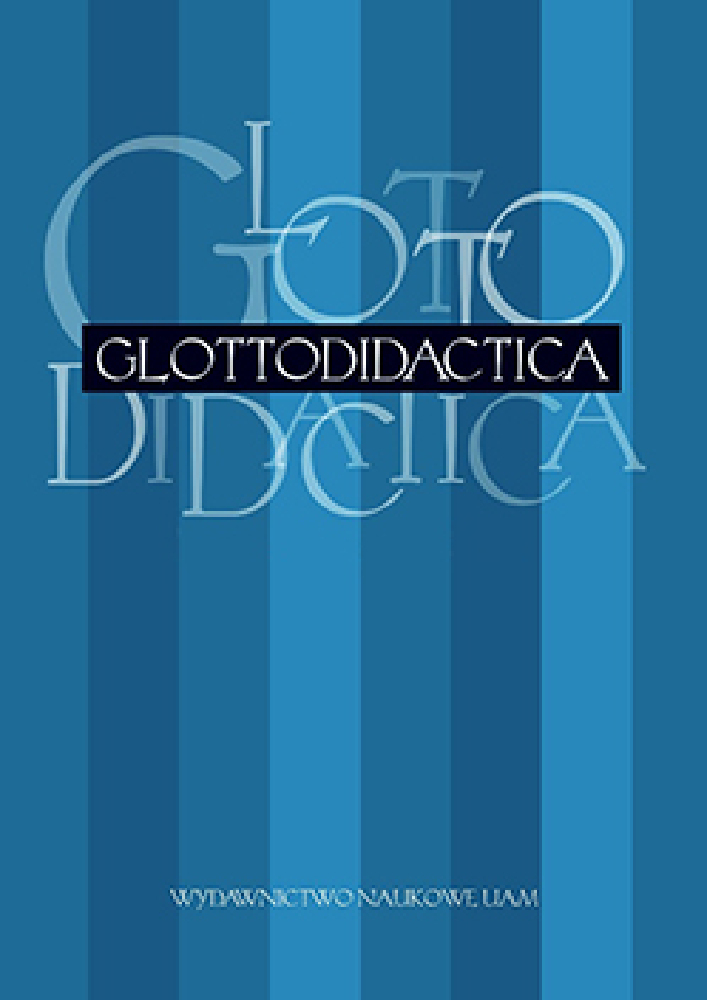Abstract
The subject of the present paper is the notion of ‘lexical competence’. This type of competence is often analysed in a too narrow sense, although over the years the notion has been broadened. Since in the Author’s opinion the definition of lexical competence should include not only the knowledge about vocabulary or its usage, but also the ability to compensate for lexical gaps, a new, slightly broader definition has been formulated and the factors were presented which may influence its developmentReferences
Aguado, K., 2004. Evaluation fremdsprachlicher Wortschatzkompetenz: Funktionen, Prinzipien, Charakteristika, Desiderate. In. Fremdsprachen Lehren und Lernen 33, 231–250.
Beile, W., 1988. Übungen und Üben im fremdsprachlichen Lernprozess. In: Der fremdsprachliche Unterricht, Heft 92, 4–7.
Bohn, R., 1999. Probleme der Wortschatzarbeit. München: Langenscheidt.
De Florio-Hansen, I., 2004. Wortschatzerwerb und Wortschatzlernen von Fremdsprachenstudierenden. Erste Ergebnisse einer empirischen Untersuchung. In: Fremdsprachen Lehren und Lernen 33, 83–113.
Desselmann, G. / Hellmich, H., 1986. Didaktik des Fremdsprachenunterrichts (Deutsch als Fremdsprache). Leipzig: Verlag Enzyklopädie.
Häussermann, U. / Piepho, H.E., 1996. Aufgaben-Handbuch. Deutsch als Fremdsprache. Abriß einer Aufgaben- und Übungstypologie. München: iudicium.
Gemeinsamer europäischer Referenzrahmen für Sprachen: lernen, lehren beurteilen. 2001. Europarat. Rat für kulturelle Zusammenarbeit, Berlin / München / Wien / Zürich / New York: Langenscheidt.
Król, A., 2008. Zintegrowany rozwój kompetencji leksykalnej w dydaktyce języka specjalistycznego. In: Przegląd Glottodydaktyczny 25, 47–52.
Löschmann, M., 1993. Effiziente Wortschatzarbeit. Alte und neue Wege. Frankfurt am Main: Peter Lang.
Nation, I.S.P., 1990. Teaching & Learning Vocabulary. New York: Newbury House.
Nation, I.S.P., 2001. Learning vocabulary in another language. Cambridge: Cambridge University Press.
Richards, J.C., 1976. The role of vocabulary teaching. In: TESOL Quarterly 10, 77–89.
Rzewólska, A., 2008. Kompetencja leksykalna i nauczanie języków obcych. In: Języki Obce w Szkole 1, 38–44.
Segermann, K., 1992. Typologie des fremdsprachlichen Übens. Bochum: Brockmeyer.
Treville, M.C. / Duquette, L., 1996. Enseigner le vocabulaire en classe de langue. Vanves: Hachette.
Wallace, M.J., 1982. Teaching Vocabulary. London: Heinemann Educational Books.
Zimmermann, R., 1990. Lexikalische Strategien: Perspektiven für die Wortschatzarbeit? In: Die Neueren Sprachen 89, 426–452.
License
Authors
Authors of texts accepted for publication in Glottodidactica are required to complete, sign and return to the Editorial team’s office the Agreement for granting a royalty-free license to works with a commitment to grant a CC sub-license.
Under the agreement, the authors of the texts published in Glottodidactica grant Adam Mickiewicz University in Poznań a non-exclusive, royalty-free license and authorize the use of Attribution-NoDerivatives 4.0 International (CC BY-ND 4.0) Creative Commons sub-license.
The authors retain the right to the free disposal of the work.
Users
Interested Internet users are entitled to use works that have been published in Glottodidactica since 2016, under the following conditions:
▪ attribution – obligation to provide, together with the distributed work, information about the authorship, title, source (link to the original work, DOI) and the license itself.
▪ no derivatives – the work must be preserved in its original form. Without the author's consent, it is not possible to distribute the modified work in the form of translations, publications, etc.
Copyrights are reserved for all texts published before 2016.
Miscellaneous
Adam Mickiewicz University in Poznań retains the property right as a whole (layout, graphic form, title, cover design, logo etc.).
Privacy statement
The names and email addresses published on this journal site will be used exclusively for the purposes declared by this journal and cannot be used for any other purpose or by any other party.




